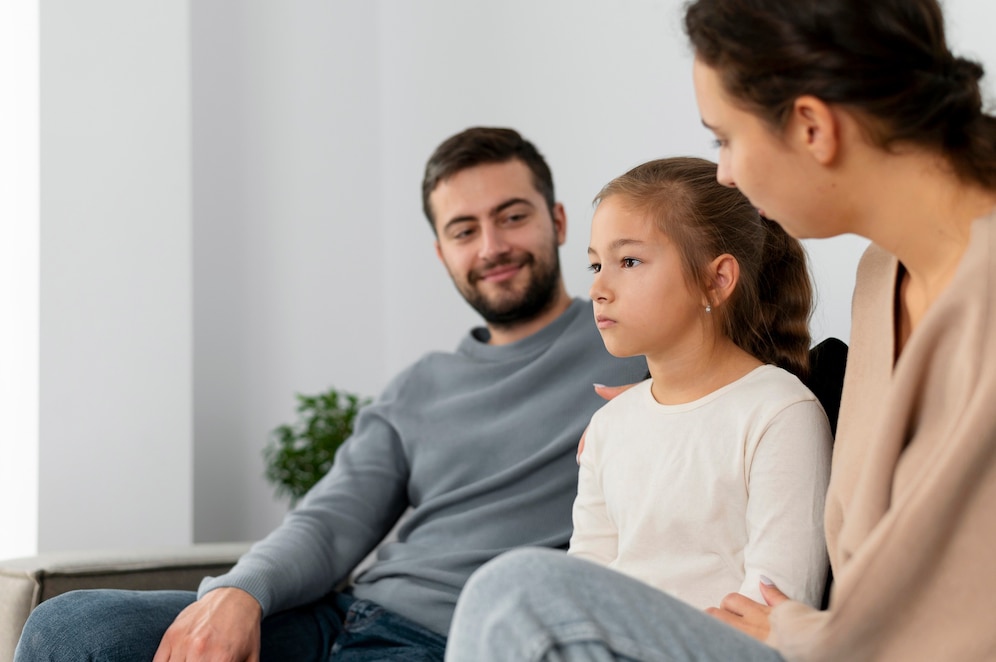
How to Answer Awkward Questions About Puberty
“Mum, What’s a Wet Dream?”
If your child has ever blurted out an unexpected question about body parts, periods, or something they overheard at school, you know that moment of freeze. Do you answer honestly? Avoid it? Laugh it off?
Welcome to the wonderful, sometimes cringeworthy, world of awkward puberty questions.
As uncomfortable as they can feel, these questions are vital windows into your child’s curiosity, confusion, and readiness to learn. And how you respond can shape their body confidence, emotional wellbeing, and trust in you for years to come.
This guide offers practical puberty discussion advice, real-world responses to tricky queries, and age-appropriate strategies to turn awkward moments into powerful parenting wins.
Why These Questions Matter More Than You Think
Curiosity Is Healthy
When your child asks questions about puberty, it’s a sign that:
- They’re paying attention to changes around them
- They trust you enough to ask
- They’re developing emotional and cognitive awareness
Avoiding or shutting down these moments sends the message that puberty is taboo, embarrassing, or shameful — and that’s a mindset that can linger.
They’re Asking to Be Reassured, Not Just Informed
A child asking, “Will it hurt when I get my period?” isn’t just looking for facts. They’re seeking emotional safety.
They want to know:
- “Am I normal?”
- “Is this scary?”
- “Will you still love and support me?”
How to Respond to Awkward Puberty Questions: General Rules

1. Stay Calm and Neutral
Your child watches your reaction closely. If you:
- Look shocked
- Laugh nervously
- Say, “We don’t talk about that!”
…you might accidentally signal that their question was wrong or inappropriate.
Instead, take a breath and say:
“That’s a great question — I’m glad you asked.”
2. Clarify What They’re Really Asking
Sometimes, their wording is off or their understanding is fuzzy Ask:
“What made you think of that?” “What do you already know about it?”
This helps you meet them where they are — without overloading them with more than they’re ready for.
3. Keep It Short and Age-Appropriate
Especially with younger kids, less is more. Start with:
- A simple answer
- A calm tone
- The chance to follow up
Then ask:
“Does that make sense?” “Do you want to know more?”
4. Be Honest
It’s okay to say:
“That’s something I didn’t learn much about growing up, but I’m learning with you.” “I’m not sure — let’s look it up together.”
Honesty builds trust more than perfect answers ever will.
Real-Life Examples: How to Handle the Toughest Questions
Below are some of the most common (and squirm-worthy) questions children ask — and some warm, honest, and age-appropriate responses you can offer.
“What’s a period?”
What They’re Really Asking:
“What is this thing I heard about that happens to girls?”
Suggested Answer:
“A period is something that happens when a girl’s body is growing up and getting ready to have babies someday — not now! It’s just part of being healthy.”
For older kids:
“Each month, the body builds a special lining in the uterus, and if there’s no baby, that lining comes out through the vagina. That’s called a period.”
“What’s an erection?”
What They’re Really Asking:
“Why does my body do this weird thing sometimes?”
Suggested Answer:
“An erection is when the penis gets hard. It can happen when you’re excited, nervous, or even for no reason at all. It’s completely normal and happens to every boy.”
Use the correct term (penis) and a neutral tone.
“Will it hurt when I get my period?”
What They’re Really Asking:
“Am I going to be in pain or scared?”
Suggested Answer:
“Some girls feel a little cramping in their tummy, but it’s usually manageable. There are ways to feel better, like using a warm water bottle, resting, or taking mild medicine if needed.”
Reassure them that you’ll help them through it.
“Do girls get hair on their private parts?”
What They’re Really Asking:
“Why is my body changing in a way that no one talks about?”
Suggested Answer:
“Yes, girls grow hair around their genitals, just like under their arms. It’s one of the signs that your body is growing up.”
No Normalise privacy and body ownership at the same time.
“Why does my voice sound funny?”
What They’re Really Asking:
“Am I weird? Why is this happening to me?”
Suggested Answer:
“Your voice is deepening — it’s totally normal. Sometimes it cracks a bit before it settles, but that’s just your body adjusting to hormones.”
Make it relatable: “Dad’s voice cracked when he was your age, too!”
“Why do my nipples hurt?”
What They’re Really Asking:
“Is something wrong with me?”
Suggested Answer:
“That’s often a sign that your breasts are starting to develop. It’s called breast budding. It’s completely normal and happens to all girls at some point.”
Offer to buy soft crop tops or bras for comfort.
“What’s a wet dream?”
What They’re Really Asking:
“Why did something wet happen while I was sleeping?”
Suggested Answer:
“It’s when a boy ejaculates (releases sperm) while sleeping. It’s totally natural — the body’s way of practising. It can be surprising, but it’s not harmful or dirty.”
Let them know it’s okay and reassure them about changing the sheets discreetly if they’re embarrassed.
“Do I have to shave down there?”
What They’re Really Asking:
“Is my body okay as it is?”
Suggested Answer:
“There’s no rule. Some people choose to shave body hair, some don’t. What matters is that you feel comfortable and take care of your body.”
Reinforce body autonomy and choice.
“When will I get boobs?”
What They’re Really Asking:
“Why don’t I look like others yet?”
Suggested Answer:
“Everyone’s body grows at its own pace. Some girls develop earlier, some later — it’s all normal.”
Emphasise that there’s no right timeline.
How to Keep the Conversation Going
Answering one question often leads to more. That’s a good thing!
Here’s how to foster ongoing communication.
Create a “Puberty Safe Zone”
Let your child know:
“You can ask me anything about your body — there’s no such thing as a weird or bad question.”
Have conversations in private, low-pressure moments:
- In the car
- During a walk
- Before bed
- While shopping for toiletries
Offer Books or Journals
Sometimes kids don’t want to talk but still want information.
- Age-appropriate puberty books
- A puberty journal with Q&A prompts
- A small box for anonymous questions
Revisit Conversations Often
Check in:
“Hey, remember when you asked about periods? Do you want to talk more about that now that you’re a bit older?”
Keep the tone light but sincere.
Real Stories from Parents
“The Period Poster”
“My 9-year-old asked, ‘What’s a period?’ I panicked and showed her a YouTube video. She cried! I realised I had overwhelmed her. We started again with a drawing and short explanation, and now she proudly made a ‘My First Period Kit’ with me.”
“Laughter Helped Us”
“When my son asked why his voice was squeaky, I told him about the time his uncle’s voice cracked during a school play. He laughed so hard — now he tells his friends not to worry when it happens to them!”
Puberty Conversation Starters (By Age Group)
Ages 6–8
- “Do you know what happens when bodies start to grow up?”
- “Your body will change someday — would you like to hear how?”
Ages 9–11
- “Some kids your age start noticing sweat or hair in new places. Have you?”
- “You might have questions about puberty — I’m here when you do.”
Ages 12+
- “Have your friends talked about anything that confused or surprised you?”
- “Do you want help preparing for your first period/wet dream/voice change?”
Conclusion: You Don’t Have to Be an Expert — Just Honest

Awkward puberty questions are actually precious opportunities — chances to educate, build trust, and reassure your child that growing up is something to embrace, not fear.
Remember:
- Stay calm and use simple, honest language
- Let their curiosity guide the pace
- Keep the puberty conversation open and ongoing
- Reassure them that their body is normal, even if it feels confusing
You’re not expected to have all the answers. You’re expected to care, listen, and be present — and that’s what makes you the right person for the job.
Let’s Hear from You!
What’s the funniest or most surprising puberty question your child has asked? Share your story in the comments — it helps other parents feel less alone. Subscribe for more practical parenting guides on puberty and beyond. Forward this to a fellow parent who’s dreading “the talk” — they’ll thank you later!


